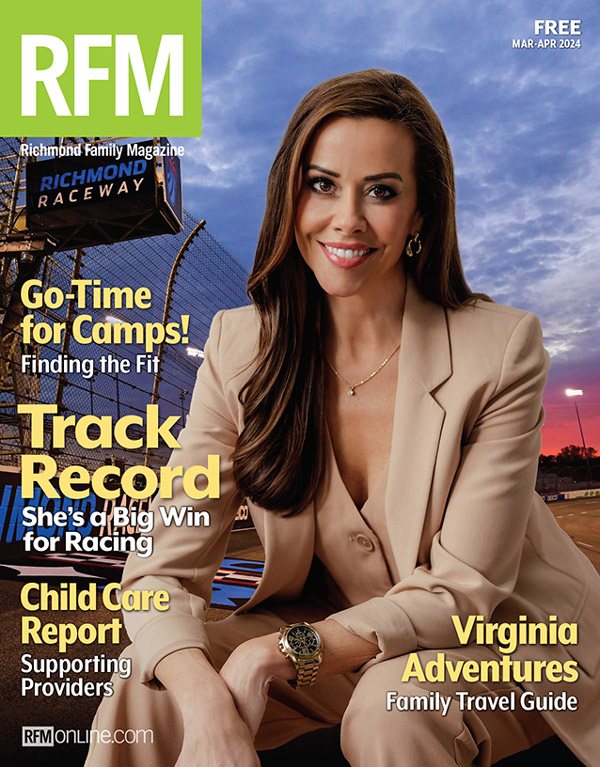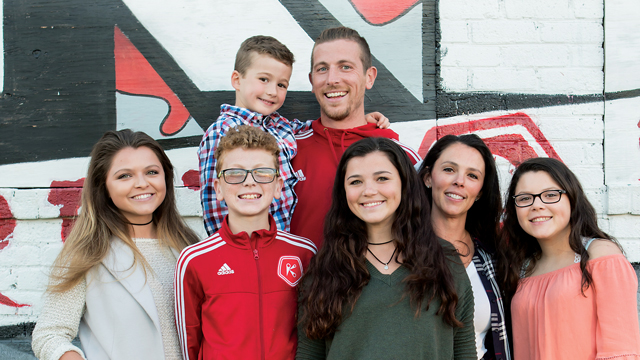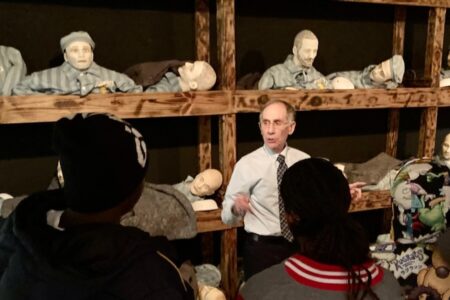
From Kent, England, to VCU to the Richmond Kickers, Matthew Delicate’s Hall of Fame soccer career is a family affair.
Matthew Delicâte Keeps It All In The Family
Last fall, at the end of the Richmond Kickers season, the Kickers’ all-time scoring leader found himself in the middle of a multi-generational Deli sandwich. Matthew Delicâte – or Deli, as he is affectionately known by family, friends, and fans – was pondering retirement. He was nearing thirty-five, had three children, and was engaged to a woman with three of her own kids to add to the family. He had a growing sports video business that was demanding more attention. His on-field production had been declining for several years, and in particular, 2016 had been sidetracked by three cracked vertebrae, a major surgery, and a cancer scare. He had gone so far as to tell Kickers’ coach Leigh Cowlishaw in his end-of-season interview that he thought he had played his last professional soccer game. His fiancé, Pat, was supportive, but two other important voices argued for him to play one more season.
One was his father, Malcolm.
“He introduced me to sports and supported me in everything I did,” Deli says. “He always pushed me to do the best I could and always kept it positive.”
He had also given Deli his middle name, Curtis, which Deli had in turn bestowed as the middle name of his oldest child, Samuel, who happened to be the other voice urging Deli to come back for one more season. Samuel, eleven, has grown up watching Deli work his magic on the soccer field, and is a soccer player himself.
Sandwiched in between the two was Deli, who says, frankly, “I didn’t want to disappoint my family.”
How he had arrived at this point says a lot about the nature of the decision he was pondering, because being a Richmond Kicker means more than just playing professional soccer.
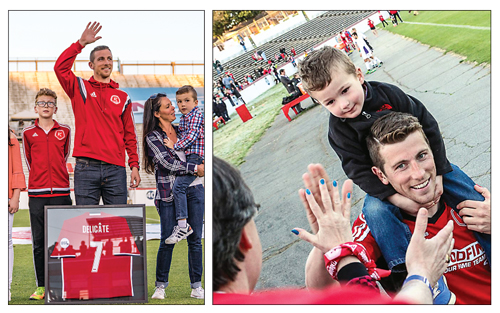
“You don’t play for the Kickers to make millions of dollars,” says Deli. You do it because you love the game of soccer and because playing soccer for a living is a dream few players ever realize. Even so, the Kickers are unique among United Soccer League teams. (The USL is a Division 2 league, the soccer equivalent of a AAA baseball team.) While most teams have a traditional deep-pocketed ownership to fund operations, the Kickers, by contrast, are a nonprofit corporation, and since their founding in 1993, they have set down deep community roots. The Richmond Kickers Youth Soccer club – for whom many of the club’s pro players, Deli included, have coached – serves thousands of families each year. Yes, these players are professional athletes playing in front of devoted fans at City Stadium and venues around the country, but they are also mentors and role models in the community. It becomes a big extended family. So when Deli talks about not wanting to disappoint family, you get the feeling he’s using the word expansively.
Delicate’s Soccer Start
Malcolm was Deli’s role model, back in his hometown of Kent, England, where Deli showed early promise on the soccer field, and, like many children, had dreams of playing professionally.
“Many parents tell their kids all the reasons they won’t be a professional athlete,” he says. “My dad never did that. He always supported me.”
After his parents divorced when he was twelve, Deli spent time in Ireland and then Newcastle Emlyn, Wales, where he was playing for the Welsh youth national team when he was scouted by a VCU assistant coach. A scholarship offer followed, and a few months later, sight unseen, Deli arrived in Richmond with two suitcases and no knowledge of the city.
“Oh, God!” he says, recalling August of 2000, “the heat and humidity. I had never experienced anything like it.”
He adjusted quickly. In his freshman season, he led VCU in scoring, and from there, he went on to be VCU’s all-time points leader, scoring forty-four goals and adding thirteen assists along the way. He was the Colonial Athletic Association player of the year in his senior season.
Becoming a Richmond Kicker
His next move was only a small step geographically – less than a mile across town from VCU to City Stadium – but a world away career-wise. Graduating from the college to professional soccer ranks meant a host of new challenges, plus new relationships that would blossom over the course of his career. It was here that he met coach Leigh Cowlishaw and fellow players Mike Burke and Sascha Görres.
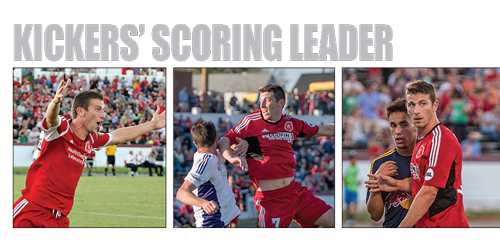
“Two of the best setup men in the league over the past fifteen years,” says Cowlishaw of Burke and Görres. And in Deli they found the perfect target. “An opportunist. An optimist. Always believing that taking the chance would yield a result.”
So, stop me if you’ve heard this one before. An Englishman, a German, and an American walk onto a soccer field. Despite their disparate national origins, Deli, Görres, and Burke often treated opposing defenses like the butt of their own inside joke.
“We’re looking at the same situation, and we have the same thought about what needs to happen,” says Görres.
Görres and Burke set up the joke, Deli delivered the punch line, and together they laughed themselves to the top of the record books. Deli owns the goals record, while Burke and Görres are first and second, respectively, on the Kickers’ all-time assists list.
True to the Kickers’ ethos, these kinds of connections persisted off the field, as well. How else do you explain the kind of brotherly dirt that Burke and Görres dish on Deli? Like Deli’s questionable dancing to his beloved electronic dance music, or his fondness for piquing prudish Americans by parading through the locker room wearing nothing but cleats and socks. (Not even shin guards? Come on, man). Or his seemingly endless store of obscure scientific trivia, such as the number of atoms in a soccer ball, and why a person’s weight at the top of Mount Everest is different than at sea level.
Consider, then, the science behind a soccer ball in flight. That soccer ball’s path is determined by the interplay of a complexity of physical factors: launch force, angular momentum, friction, wind resistance, and gravity. To compute such a path, one must integrate physics and differential calculus, incorporating variables that change over tiny fractions of a second. For all of his affinity for science, Deli is no supercomputer. So how do we explain the fact that so many of these flight paths were initiated by Burke or Görres, and then found Deli’s foot, or head, which in turn redirected them with the precise counter forces and angles necessary to guide them into the opponent’s net?
Burke explains it via another branch of science. “Chemistry, pure and simple. We always knew that if we put the ball in a certain area, there was a really good chance Deli would be there. It’s like we all saw three seconds into the future, and we all saw the same thing.”
On April 22, 2016, Deli scored what turned out to be the final goal of his professional career against the Charlotte Independence. It was vintage Deli. Having entered the game in the eighty-fifth minute, he found a seam in the Charlotte defense that allowed him to bolt home a prescient pass from teammate Jason Yeisley in the final minute of regulation.
Decision Time
A different kind of bolt would strike a few days later. A violent collision in training led to three cracked vertebrae and what doctors feared might be a laceration of his kidney. Subsequent scans turned up something far more concerning: a kidney mass that doctors told him had a 90 percent likelihood of being cancer.
“Devastating,” he says. “Pat was in the room with me, and it seemed like they left us for an eternity in there to reflect on the news.” Surgery followed quickly, and when the pathology turned out to be clear, “it was quite surreal,” recalls Deli, but he quickly turned his attention to recovery and a return to the field.
First, though, there was a trip to the beach in June. His England family flew over and joined his family here. It was the first time the whole group had been together all in one place since he was twelve. It was the first summer vacation he’d taken as a grown-up. Deli began to reflect on life beyond professional sports, beginning
with the family around him.
Deli’s daughter, Sophia, is in second grade and likes dancing and art. “She’s tall for her age,” says Deli, “and very athletic,” which sounds a lot like how many would describe Deli himself.
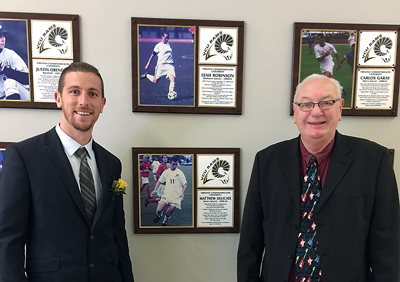
William, at age five, is just starting with sports, so his path remains to be seen, but Deli says that he already displays a lot of grit. “He’s the youngest child,” says Deli, “so he has to do a lot just to keep up.”
Pat has three daughters of her own – Rosa, Adrianna, and Lola – who range in age from twenty-one down to thirteen. He and Pat have learned to be flexible as they parent across such wide age differences.
But how does he parent a soccer player? It would be very easy, after all, for Deli to meddle in his firstborn Samuel’s soccer pursuits. In addition to his playing duties, Deli has also been a coach in the Kickers youth system for many years. (He, Burke, and Cowlishaw have coached one another’s kids, so when we say the Kickers is a family organization, we really mean it!) So, for a guy who is not only a professional player, but also a youth coach, it would be tempting to, you know, be all up in Samuel’s grill with the whole soccer thing.
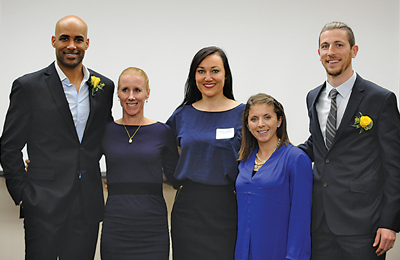
“I’m a very competitive person,” he says. “Sometimes my fiancé Pat gets angry because I have to win at everything. That’s part of being a professional athlete, I think. But you’ll never hear me yelling on the sideline, unless I’m cheering about a goal or something positive. After a game, if Samuel wants to talk about it, that’s fine, but otherwise he should be getting feedback from his coach. I’ve witnessed despicable parent behavior over the years. The criticism and the critiquing during games, and then kids get the third degree afterwards.
The players are out there to put into practice what they’ve worked on with their coach during training, and that’s where the feedback needs to happen.”
One gets the sense Deli’s father, Malcolm, would agree.
Deli returned to competition August 27, 2016, and played in the Kickers’ final seven games, but after the season ended in a first-round USL playoff loss, he was pretty sure he’d come to the end of his soccer career.
Which is how he came to find himself sandwiched between Malcolm and Samuel with his retirement decision. “My dad and Samuel said the same thing. They both felt like it had been a difficult season, with the injury and the surgery, and they wanted me to go for one more year.”
He understood their position. “There was definitely a part of me that agreed with them, that wanted to train hard and come back to prove that I could do it again.”
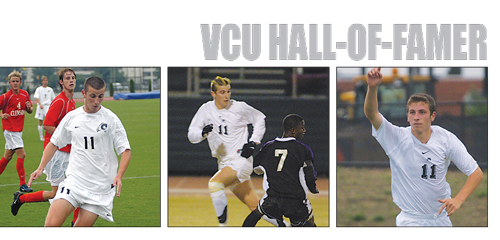
But even more important was supporting his family long-term. He had already laid the groundwork in this area. In 2015, in partnership with fellow Kickers player Nate Shiffman, he had launched CineSports, a company providing video recording and analysis services to youth athletes and their teams. Business was good, and opportunities for expanding were taking more of Deli’s time. As much as he felt the pull of returning for one more year as a pro player, Deli felt the time was right to make the change.
Pat agreed. Cowlishaw understood. His fellow Kickers supported him, as well. All those members of the extended family were on board. But what about the Deli sandwich – his dad and his older son – would they understand?
On February 7 of this year, Matthew Delicâte celebrated his thirty-fifth birthday. On February 11, he was the third soccer player ever inducted into the VCU Hall of Fame. On February 13, he officially announced his retirement from the Kickers. A few days before all this happened, his dad had flown to the United States to show his support for Deli’s decision. Samuel had made his own personal journey, as well, and had arrived at a place of acceptance. Three generations of Delicâtes celebrated these milestones together – as one big family, on and off the field.
Photos: Chris Moore, Casey Templeton, Brian L. Zimmerman, Jessica Stone Hendricks, James H. Loving

